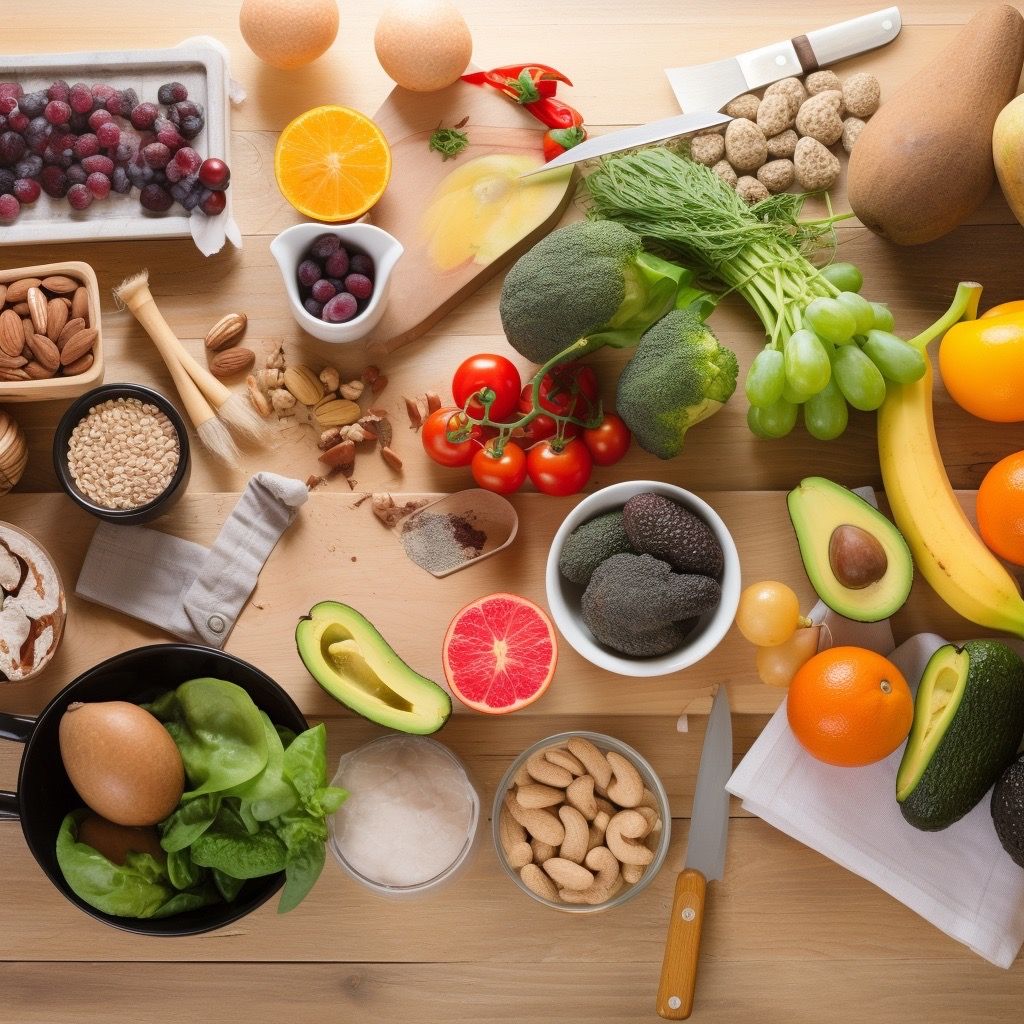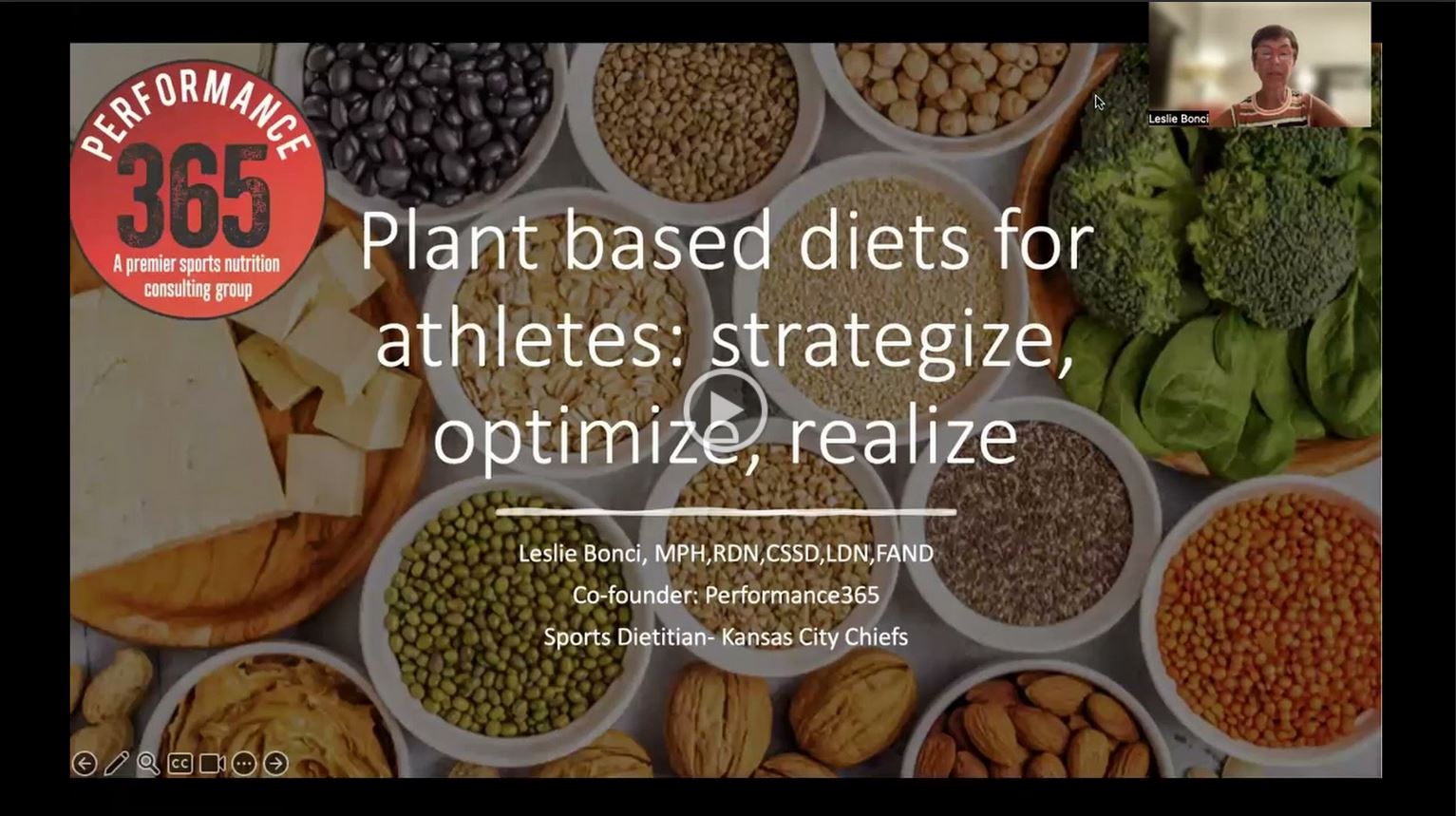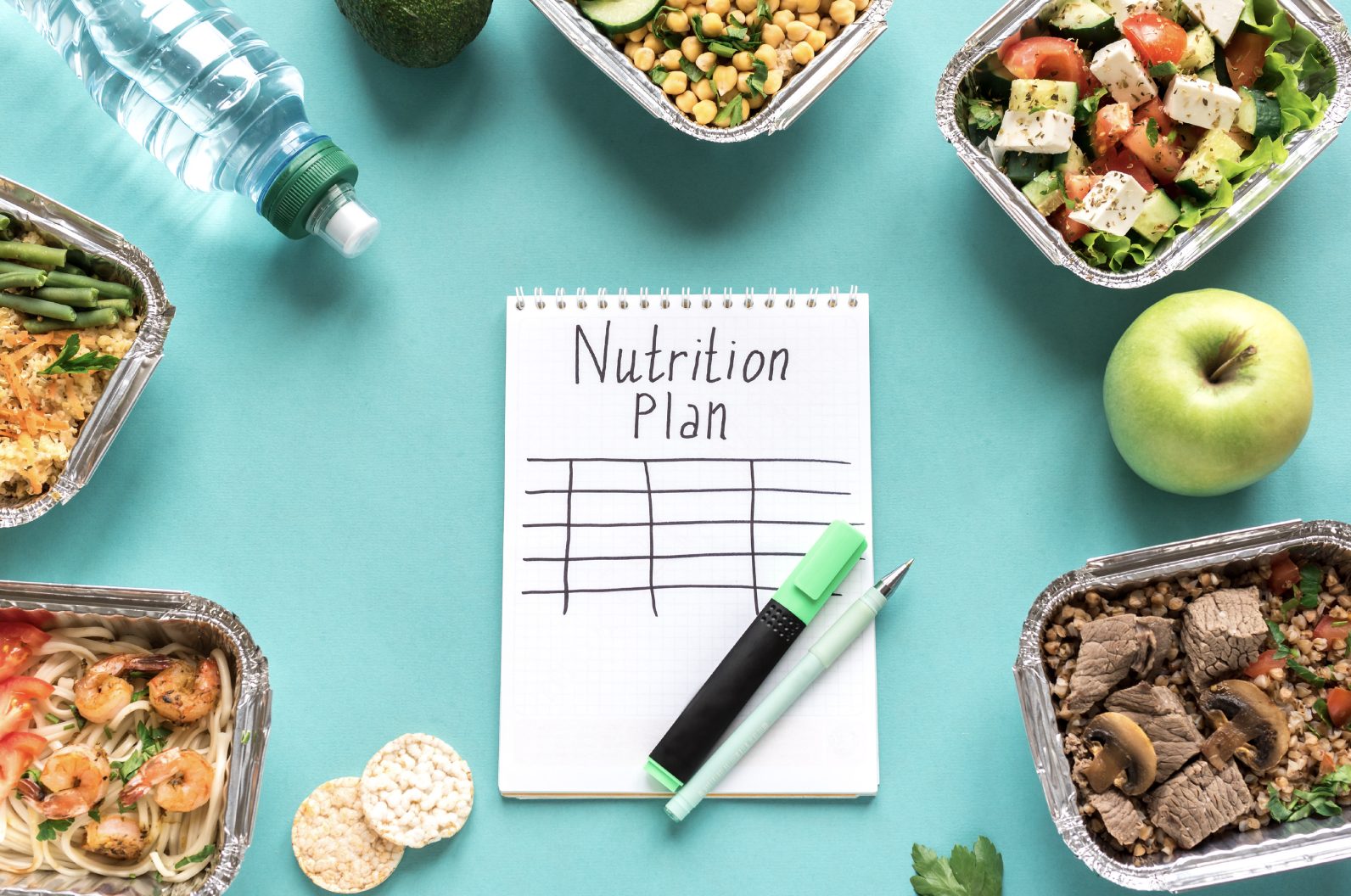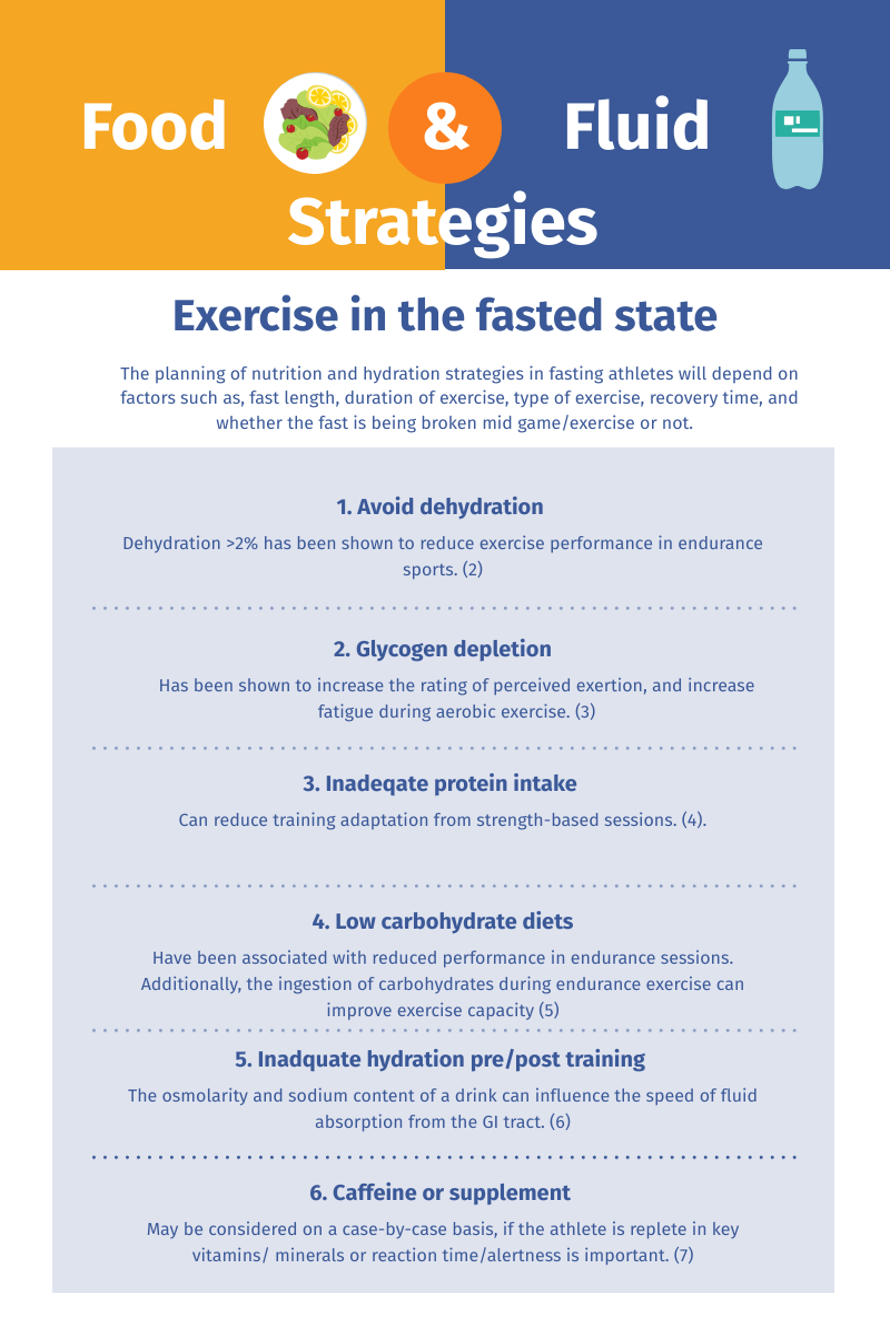Contents
I. Introduction

Welcome to the world of sports nutrition! As an athlete, you know that your performance is not only determined by your training and skills but also by what you fuel your body with. Nutrition plays a crucial role in optimizing your performance and helping you reach your goals.
In this article, we will explore the importance of nutrition for athletes and how you can use food to enhance your performance. We will delve into the specific nutrients that are essential for athletes, discuss the timing and composition of meals, and provide practical tips on meal planning and supplementation.
Whether you are a professional athlete or a weekend warrior, this article is for you. We will address the needs and interests of athletes of all levels and sports. No matter what your sport or fitness goals are, the information provided here will help you make informed choices about your nutrition and take your performance to the next level.
Throughout this article, we will debunk common myths and misconceptions about sports nutrition, providing evidence-based information that is backed by scientific research. We will also provide practical examples and real-life scenarios to help you apply the principles of sports nutrition in your own life.
So, if you are ready to optimize your performance with food, let’s dive in and explore the fascinating world of sports nutrition!
II. Macronutrients for Athletes

A. Carbohydrates
Carbohydrates play a crucial role in providing energy for athletes. They are the body’s primary source of fuel, especially during high-intensity activities. When consumed, carbohydrates are broken down into glucose, which is then stored in the muscles and liver as glycogen. During exercise, glycogen is converted back into glucose to provide energy.
For athletes, it is important to choose the right types of carbohydrates that can provide sustained energy. Complex carbohydrates, such as whole grains, fruits, and vegetables, are preferred over simple carbohydrates like sugary snacks and drinks. Complex carbohydrates are digested more slowly, resulting in a steady release of energy and preventing blood sugar spikes.
The recommended daily intake of carbohydrates for athletes varies depending on their training intensity and duration. Generally, it is recommended that athletes consume 3-5 grams of carbohydrates per kilogram of body weight per day. This ensures an adequate supply of energy for optimal performance and recovery.
B. Proteins
Proteins are essential for athletes as they play a vital role in muscle repair and growth. During exercise, muscle tissues undergo wear and tear, and proteins help in repairing and rebuilding these tissues. They also contribute to the synthesis of enzymes, hormones, and antibodies, which are crucial for overall health and immune function.
Athletes should focus on consuming high-quality proteins that contain all the essential amino acids. Good sources of protein include lean meats, poultry, fish, eggs, dairy products, legumes, and plant-based proteins like tofu and tempeh. It is important to distribute protein intake evenly throughout the day to optimize muscle protein synthesis.
The recommended daily intake of proteins for athletes is around 1.2-2.0 grams per kilogram of body weight. This amount may vary depending on the type and intensity of training, as well as individual goals and needs.
C. Fats
Fats are an important macronutrient for athletes as they provide a concentrated source of energy. They play a crucial role in energy production, hormone regulation, and the absorption of fat-soluble vitamins. Fats also help in maintaining healthy cell membranes and cushioning vital organs.
When it comes to fats, athletes should focus on consuming healthy unsaturated fats while limiting saturated and trans fats. Good sources of healthy fats include avocados, nuts, seeds, olive oil, fatty fish like salmon and mackerel, and nut butter. These fats provide essential fatty acids, such as omega-3 and omega-6, which have anti-inflammatory properties and support overall health.
The recommended daily intake of fats for athletes is around 20-35% of total daily calories. It is important to note that fat intake should be individualized based on energy needs and overall dietary goals.
In conclusion, macronutrients play a crucial role in optimizing performance for athletes. Carbohydrates provide the necessary energy, proteins aid in muscle repair and growth, and fats contribute to energy production and hormone regulation. It is important for athletes to choose the right types and amounts of macronutrients to meet their specific needs and goals. By fueling their bodies with the right nutrients, athletes can enhance their performance, support recovery, and maintain overall health.
III. Micronutrients for Athletes

Athletes require a well-balanced diet to fuel their bodies and optimize their performance. While macronutrients like carbohydrates, proteins, and fats are often in the spotlight, micronutrients play a crucial role in supporting overall health and athletic performance. In this section, we will explore the essential vitamins and minerals that athletes should include in their diet, along with food sources and recommended daily intake.
A. Vitamins
Vitamins are organic compounds that are essential for various bodily functions. They act as coenzymes, facilitating chemical reactions that are vital for energy production, metabolism, and overall health. For athletes, certain vitamins are particularly important for optimal performance.
1. Essential vitamins for optimal athletic performance
One of the key vitamins for athletes is vitamin B complex, which includes B1 (thiamine), B2 (riboflavin), B3 (niacin), B5 (pantothenic acid), B6 (pyridoxine), B7 (biotin), B9 (folate), and B12 (cobalamin). These vitamins are involved in energy metabolism, red blood cell production, and the synthesis of neurotransmitters, all of which are critical for athletic performance.
Vitamin C, also known as ascorbic acid, is another important vitamin for athletes. It acts as an antioxidant, protecting cells from oxidative stress caused by intense physical activity. Additionally, vitamin C plays a role in collagen synthesis, which is crucial for maintaining healthy connective tissues, such as tendons and ligaments.
2. Food sources rich in vitamins
Athletes can obtain essential vitamins from a variety of food sources. Whole grains, such as brown rice and whole wheat bread, are excellent sources of B vitamins. Lean meats, fish, and poultry are also rich in B vitamins, particularly vitamin B12. Leafy green vegetables, citrus fruits, berries, and bell peppers are great sources of vitamin C.
3. Recommended daily intake of vitamins for athletes
The recommended daily intake of vitamins for athletes may vary depending on factors such as age, sex, and level of physical activity. However, a general guideline for adult athletes is as follows:
- Vitamin B complex: 1.2-2.4 mg/day
- Vitamin C: 75-90 mg/day
It’s important to note that these values may differ for specific individuals, so it’s always best to consult with a healthcare professional or registered dietitian for personalized recommendations.
B. Minerals
Minerals are inorganic substances that are essential for various physiological processes in the body. They play a crucial role in maintaining fluid balance, nerve function, muscle contraction, and bone health. For athletes, certain minerals are particularly important for overall health and performance.
1. Important minerals for athletes’ health and performance
Calcium is a mineral that is essential for bone health and muscle function. It plays a crucial role in muscle contraction and helps maintain strong bones, which are important for athletes to prevent injuries. Iron is another important mineral for athletes, as it is involved in oxygen transport and energy production. Iron deficiency can lead to fatigue and decreased athletic performance.
2. Food sources rich in minerals
Dairy products, such as milk, cheese, and yogurt, are excellent sources of calcium. Leafy green vegetables, such as spinach and kale, also provide calcium. Iron-rich foods include lean meats, poultry, fish, beans, lentils, and fortified cereals.
3. Recommended daily intake of minerals for athletes
The recommended daily intake of minerals for athletes may vary depending on factors such as age, sex, and level of physical activity. However, a general guideline for adult athletes is as follows:
- Calcium: 1000-1300 mg/day
- Iron: 8-18 mg/day
Again, it’s important to note that these values may differ for specific individuals, so it’s best to consult with a healthcare professional or registered dietitian for personalized recommendations.
IV. Hydration for Athletes

A. Importance of proper hydration during exercise
Staying properly hydrated is crucial for athletes to perform at their best. When you exercise, your body loses water through sweat, and if you don’t replenish it, you can become dehydrated. Dehydration can lead to a decrease in performance, muscle cramps, fatigue, and even heat-related illnesses. It’s essential to drink enough fluids before, during, and after exercise to maintain optimal hydration levels.
B. Signs of dehydration and overhydration
Recognizing the signs of dehydration and overhydration is important for athletes to take appropriate action. Dehydration symptoms include increased thirst, dry mouth, dark-colored urine, fatigue, dizziness, and muscle cramps. On the other hand, overhydration, also known as hyponatremia, occurs when you drink too much water without replenishing electrolytes. Symptoms of overhydration include nausea, headache, confusion, and in severe cases, seizures or coma. It’s crucial to find the right balance and listen to your body’s signals.
C. Strategies for staying hydrated during training and competition
1. Drink plenty of fluids before exercise: Start your workout well-hydrated by drinking water or sports drinks at least two hours before your training or competition. This will ensure that you have enough fluids in your system to sustain you throughout the activity.
2. Hydrate during exercise: During prolonged exercise sessions, it’s important to drink fluids regularly to replace the water lost through sweat. Aim to drink about 7 to 10 ounces of fluid every 10 to 20 minutes. Sports drinks can be beneficial as they provide electrolytes and carbohydrates that help maintain hydration and provide energy.
3. Monitor your urine color: One way to gauge your hydration status is by checking the color of your urine. If it’s pale yellow, you’re likely well-hydrated. However, if it’s dark yellow or amber, it’s a sign that you need to drink more fluids.
4. Replenish electrolytes: When you sweat, you not only lose water but also essential electrolytes like sodium, potassium, and magnesium. To maintain electrolyte balance, consider consuming sports drinks or electrolyte-rich foods like bananas, oranges, and coconut water.
5. Be mindful of environmental conditions: Hot and humid weather can increase fluid loss through sweat, so it’s crucial to drink more fluids in such conditions. Additionally, high-altitude environments can also increase your water needs.
6. Listen to your body: Everyone’s hydration needs are different, so it’s important to listen to your body’s signals. If you feel thirsty, drink fluids. Don’t wait until you’re excessively thirsty, as it can be a sign of dehydration.
By following these strategies, athletes can ensure they stay properly hydrated during training and competition, optimizing their performance and reducing the risk of dehydration-related issues.
V. Pre-Workout Nutrition

When it comes to optimizing performance, pre-workout nutrition plays a crucial role. The timing and composition of your pre-workout meals, as well as the suitable foods and snacks you choose, can significantly impact your energy levels, endurance, and overall athletic performance. Hydration considerations are also essential to ensure you are adequately fueled before exercise. In this section, we will delve into these aspects of pre-workout nutrition to help you make informed choices and maximize your workout potential.
A. Timing and Composition of Pre-Workout Meals
The timing of your pre-workout meal is key to ensure you have enough energy to sustain your workout without feeling sluggish or weighed down. Ideally, you should aim to consume a meal or snack containing a balance of carbohydrates, protein, and healthy fats about 1-3 hours before your workout.
Carbohydrates are the primary fuel source for your muscles, providing the energy needed for high-intensity exercise. Opt for complex carbohydrates such as whole grains, fruits, and vegetables, as they release energy slowly and provide a steady source of fuel throughout your workout.
Protein is essential for muscle repair and growth. Including a moderate amount of protein in your pre-workout meal can help prevent muscle breakdown during exercise. Good sources of protein include lean meats, poultry, fish, eggs, dairy products, and plant-based options like tofu or legumes.
Incorporating healthy fats into your pre-workout meal can help slow down the digestion of carbohydrates, providing a sustained release of energy. Avocado, nuts, seeds, and olive oil are excellent sources of healthy fats that can be included in your pre-workout meal.
B. Suitable Foods and Snacks for Pre-Workout Fueling
Choosing the right foods and snacks for pre-workout fueling is essential to ensure you have the energy and nutrients necessary for optimal performance. Here are some suitable options to consider:
- Whole grain toast with peanut butter and sliced banana
- Greek yogurt with berries and a drizzle of honey
- Oatmeal topped with nuts and dried fruits
- Grilled chicken or fish with quinoa and steamed vegetables
- Fruit smoothie with protein powder
- Hard-boiled eggs with whole grain crackers
- Veggie omelet with whole wheat toast
- Trail mix with a mix of nuts, seeds, and dried fruits
These options provide a good balance of carbohydrates, protein, and healthy fats, ensuring you have the necessary nutrients to fuel your workout and support muscle recovery.
C. Hydration Considerations Before Exercise
Proper hydration is crucial for optimal athletic performance. Before your workout, it’s essential to ensure you are adequately hydrated to prevent dehydration, which can lead to fatigue, muscle cramps, and decreased performance.
Here are some hydration considerations to keep in mind before exercise:
- Drink water throughout the day to maintain hydration levels.
- Avoid excessive caffeine and alcohol consumption, as they can contribute to dehydration.
- Consume fluids containing electrolytes to replenish the minerals lost through sweat.
- Monitor your urine color; pale yellow indicates good hydration, while dark yellow indicates dehydration.
- Consider weighing yourself before and after exercise to determine fluid loss and adjust your hydration strategy accordingly.
Remember, everyone’s hydration needs are different, so it’s essential to listen to your body and adjust your fluid intake accordingly.
By paying attention to the timing and composition of your pre-workout meals, choosing suitable foods and snacks, and ensuring proper hydration, you can optimize your performance and get the most out of your workouts. Experiment with different options and listen to your body to find what works best for you. Remember, consistency is key, and fueling your body properly before exercise will contribute to improved athletic performance and overall well-being.
VI. Post-Workout Nutrition
When it comes to optimizing performance and aiding in recovery, post-workout nutrition plays a crucial role. After an intense workout, your body needs the right nutrients to replenish energy stores, repair muscle tissue, and promote overall recovery. In this section, we will explore the importance of post-workout nutrition, the ideal macronutrient ratios for optimal recovery, and suitable foods and supplements to include in your post-workout routine.
A. Importance of post-workout nutrition for recovery
Proper post-workout nutrition is essential for maximizing recovery and achieving optimal performance. During exercise, your muscles undergo stress and micro-tears, and glycogen stores are depleted. Consuming the right nutrients after your workout helps replenish glycogen stores, repair muscle tissue, and reduce muscle soreness.
One of the key goals of post-workout nutrition is to stimulate muscle protein synthesis (MPS), the process by which new muscle proteins are formed. Consuming a combination of protein and carbohydrates within the post-workout window can enhance MPS and promote muscle growth and repair.
Additionally, post-workout nutrition helps restore electrolyte balance and hydration levels, which may have been depleted during exercise. Replenishing fluids and electrolytes is crucial for maintaining optimal performance and preventing dehydration.
B. Macronutrient ratios for optimal recovery
When it comes to post-workout nutrition, the ideal macronutrient ratios vary depending on individual goals and preferences. However, a general guideline is to consume a combination of protein and carbohydrates in a 3:1 or 4:1 ratio.
Protein is essential for muscle repair and growth. Aim to consume around 20-30 grams of high-quality protein within the first hour after your workout. Good sources of protein include lean meats, poultry, fish, eggs, dairy products, and plant-based options like tofu, tempeh, and legumes.
Carbohydrates are crucial for replenishing glycogen stores and providing energy for recovery. Aim to consume around 0.5-0.7 grams of carbohydrates per pound of body weight after your workout. Opt for complex carbohydrates like whole grains, fruits, vegetables, and legumes, which provide a steady release of energy.
In addition to protein and carbohydrates, including a small amount of healthy fats in your post-workout meal can help with nutrient absorption and provide sustained energy. Good sources of healthy fats include avocados, nuts, seeds, and olive oil.
C. Suitable foods and supplements for post-workout nutrition
When it comes to choosing suitable foods for post-workout nutrition, focus on nutrient-dense options that provide a good balance of protein, carbohydrates, and other essential nutrients. Here are some examples:
- Grilled chicken breast with quinoa and roasted vegetables
- Salmon with sweet potatoes and steamed broccoli
- Greek yogurt with berries and a sprinkle of nuts
- Protein smoothie made with whey or plant-based protein powder, fruits, and almond milk
- Whole grain toast with avocado and scrambled eggs
In addition to whole foods, there are also various supplements that can support post-workout recovery. Some popular options include:
- Whey protein powder: Provides a convenient and easily digestible source of high-quality protein.
- Creatine: Helps replenish ATP stores and improve strength and muscle recovery.
- BCAAs (branched-chain amino acids): Can enhance muscle protein synthesis and reduce muscle soreness.
- Glutamine: Supports immune function and muscle recovery.
- Electrolyte drinks: Help replenish electrolytes lost through sweat and maintain hydration.
It’s important to note that while supplements can be beneficial, they should not replace a well-balanced diet. It’s always best to prioritize whole foods and use supplements as a complement to your nutrition plan.
VII. Nutrition for Endurance Athletes
A. Energy requirements for endurance activities
Endurance activities, such as long-distance running, cycling, or swimming, require a significant amount of energy to sustain performance. As an endurance athlete, it is crucial to understand your energy requirements to optimize your performance and avoid fatigue or burnout.
The energy requirements for endurance activities can vary depending on factors such as body weight, intensity, duration, and environmental conditions. On average, an endurance athlete may need anywhere from 300 to 800 calories per hour of exercise. However, individual needs may vary, and it is essential to listen to your body and make adjustments accordingly.
To determine your specific energy requirements, you can consult with a sports nutritionist or use online calculators that take into account your body weight, activity level, and training goals. These tools can provide you with a rough estimate of the number of calories you need to consume before, during, and after endurance activities.
B. Carbohydrate loading strategies for endurance events
Carbohydrate loading is a common strategy used by endurance athletes to maximize glycogen stores in the muscles and liver. Glycogen is the primary fuel source for endurance activities, and having adequate stores can delay fatigue and improve performance.
There are several carbohydrate loading strategies that endurance athletes can employ before a big event:
- Traditional method: This involves depleting glycogen stores through a period of intense training followed by a high-carbohydrate diet in the days leading up to the event.
- Modified method: This approach combines moderate training with a gradual increase in carbohydrate intake in the days leading up to the event.
- Low glycogen depletion method: This strategy involves reducing carbohydrate intake and training intensity in the days leading up to the event to enhance glycogen storage capacity.
It is important to note that carbohydrate loading should be practiced under the guidance of a sports nutritionist or coach to ensure it is tailored to your specific needs and goals. Additionally, it is essential to experiment with different strategies during training to determine what works best for your body.
C. Hydration and fueling during long-duration exercise
Proper hydration and fueling during long-duration exercise are crucial for maintaining performance and preventing dehydration and fatigue. As an endurance athlete, you should have a well-defined hydration and fueling plan in place to optimize your performance.
Hydration:
During long-duration exercise, it is important to replace fluids lost through sweat to prevent dehydration. The American College of Sports Medicine recommends consuming 16 to 20 ounces of fluid two to three hours before exercise and 6 to 12 ounces every 15 to 20 minutes during exercise. However, individual fluid needs may vary based on factors such as sweat rate, temperature, and exercise intensity.
Fueling:
Endurance activities deplete glycogen stores, and it is important to replenish them to maintain energy levels. Consuming carbohydrates during exercise can help delay fatigue and improve performance. Aim to consume 30 to 60 grams of carbohydrates per hour of exercise. This can be in the form of sports drinks, gels, energy bars, or real food options such as bananas or dates.
It is important to practice your hydration and fueling strategies during training to determine what works best for your body. Everyone is different, and it may take some trial and error to find the right balance of fluids and carbohydrates that keeps you properly fueled and hydrated during long-duration exercise.
Remember, nutrition plays a vital role in optimizing performance for endurance athletes. Understanding your energy requirements, employing carbohydrate loading strategies, and having a well-defined hydration and fueling plan can help you reach your full potential and achieve your goals.
VIII. Nutrition for Strength and Power Athletes
Achieving optimal performance as a strength and power athlete requires careful attention to nutrition. Proper fueling and recovery strategies can significantly enhance muscle growth, repair, and overall strength gains. In this section, we will explore the protein requirements for muscle growth and repair, the importance of a calorie surplus for strength gains, and effective nutritional strategies for maximizing strength and power.
A. Protein Requirements for Muscle Growth and Repair
Protein is an essential macronutrient for strength and power athletes as it plays a crucial role in muscle growth and repair. When engaging in intense resistance training, the muscles undergo microscopic damage, and protein is needed to repair and rebuild these damaged muscle fibers.
The recommended protein intake for strength and power athletes is higher than that of the general population. It is generally recommended to consume around 1.2 to 2 grams of protein per kilogram of body weight per day. However, individual protein needs may vary depending on factors such as training intensity, body composition goals, and overall calorie intake.
It is important to distribute protein intake evenly throughout the day to optimize muscle protein synthesis. Consuming a source of high-quality protein, such as lean meats, poultry, fish, eggs, dairy products, or plant-based protein sources, with each meal and snack can help meet the protein requirements for muscle growth and repair.
B. Importance of Calorie Surplus for Strength Gains
Building strength and power requires a calorie surplus, which means consuming more calories than your body needs for maintenance. This surplus provides the energy and nutrients necessary for muscle growth and performance improvements.
When in a calorie surplus, the body has an abundance of fuel available, which can support intense training sessions and promote muscle hypertrophy. It is important to note that the quality of calories consumed is equally important as the quantity. Opting for nutrient-dense foods such as lean proteins, whole grains, fruits, vegetables, and healthy fats ensures that the body receives the necessary vitamins, minerals, and macronutrients for optimal performance.
Calculating the exact calorie surplus needed can be challenging and may require the assistance of a registered dietitian or sports nutritionist. Factors such as training volume, intensity, body composition goals, and individual metabolism should be considered when determining the appropriate calorie surplus.
C. Nutritional Strategies for Maximizing Strength and Power
While protein and calorie surplus are critical for strength gains, other nutritional strategies can further enhance performance for strength and power athletes.
1. Carbohydrate Timing and Intake: Consuming carbohydrates before and after training sessions can provide the necessary energy for optimal performance and aid in muscle glycogen replenishment. Including a mix of complex carbohydrates, such as whole grains, fruits, and vegetables, can help sustain energy levels throughout the day.
2. Hydration: Proper hydration is essential for optimal performance and recovery. Adequate water intake helps maintain body temperature, transport nutrients, and remove waste products. Athletes should aim to drink enough fluids to maintain urine color in the pale yellow range.
3. Micronutrient Intake: Ensuring an adequate intake of vitamins and minerals is crucial for overall health and performance. Including a variety of fruits, vegetables, whole grains, lean proteins, and healthy fats can help meet micronutrient needs.
4. Supplementation: While a well-balanced diet should provide most of the necessary nutrients, certain supplements may be beneficial for strength and power athletes. Creatine monohydrate, for example, has been shown to enhance strength and power output when combined with resistance training.
It is important to note that individual nutritional needs may vary, and consulting with a registered dietitian or sports nutritionist can help create a personalized nutrition plan tailored to specific goals and requirements.
IX. Nutrition for Team Sports Athletes
In team sports, athletes require a specific nutrition plan to optimize their performance on the field. The energy demands of team sports can be intense, and it is crucial for athletes to fuel their bodies properly to meet these demands. Additionally, carbohydrate and protein needs, as well as hydration and recovery strategies, play a vital role in supporting team sports performance.
A. Energy demands of team sports
Team sports require a significant amount of energy due to the constant movement, sprinting, and quick changes in direction. Athletes need to consume enough calories to meet these energy demands and maintain their performance throughout the game. The exact energy requirements vary depending on factors such as body composition, training intensity, and duration of the game.
Carbohydrates are the primary source of energy for team sports athletes. They provide the necessary fuel for high-intensity activities and help replenish glycogen stores in the muscles. It is recommended that athletes consume a diet rich in complex carbohydrates such as whole grains, fruits, and vegetables to sustain their energy levels.
Furthermore, including a moderate amount of healthy fats in the diet can provide a secondary source of energy and support overall performance. Healthy fats can be found in foods like avocados, nuts, and olive oil.
B. Carbohydrate and protein needs for team sports performance
Carbohydrates play a crucial role in team sports performance as they provide the necessary energy for intense physical activity. Athletes should aim to consume around 55-60% of their total daily calories from carbohydrates. This can be achieved by incorporating foods such as whole grains, fruits, vegetables, and legumes into their meals and snacks.
Protein is also essential for team sports athletes as it aids in muscle repair and recovery. Athletes should aim to consume approximately 1.2-2.0 grams of protein per kilogram of body weight per day. Good sources of protein include lean meats, poultry, fish, dairy products, and plant-based sources such as tofu and beans.
It is important to note that individual protein needs may vary based on factors such as training intensity, muscle mass, and overall goals. Consulting with a sports nutritionist or dietitian can help determine the specific protein requirements for each athlete.
C. Hydration and recovery strategies for team sports
Hydration is crucial for team sports athletes to maintain optimal performance and prevent dehydration. Athletes should aim to drink fluids regularly before, during, and after training or competition. Water is usually sufficient for hydration, but for intense or prolonged activities, sports drinks that contain electrolytes may be beneficial.
Recovery strategies are also essential for team sports athletes to promote muscle repair and reduce the risk of injury. Adequate rest, proper nutrition, and stretching can all contribute to effective recovery. Consuming a post-workout meal or snack that includes a combination of carbohydrates and protein can help replenish glycogen stores and support muscle recovery.

William Black is a seasoned wordsmith with a passion for crafting compelling content. Hailing from the vibrant city of Seattle, he has honed his writing skills through years of experience in the field. William holds a Bachelor’s degree in English Literature from the prestigious University of Washington, where he developed a deep appreciation for the power of storytelling. His educational background has equipped him with a keen eye for detail and a strong command of the English language. With a particular expertise in SEO writing, William effortlessly weaves keywords into his prose, ensuring maximum visibility and engagement. When he’s not busy crafting captivating content, you can find William exploring the local food scene, indulging in his love for all things culinary.
